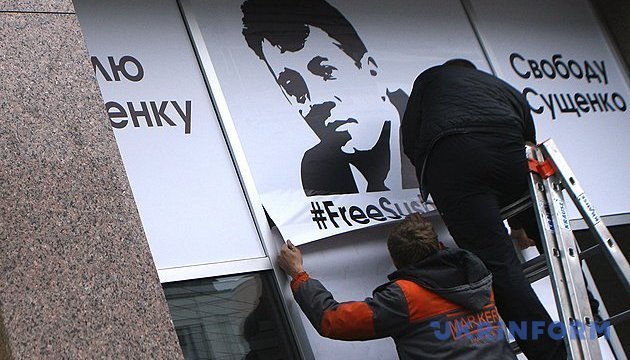
New Russian fairytales: 12 months in Lefortovo
In the present archaic Russia they like to take as an example the old days... In the pre-Petrine Muscovy, the New Year began on September 1, and in the post-Petrine era it began on January 1. Sushchenko was arrested somewhere in the middle, on Friday, September 30, during his private visit to Moscow. On October 1, he spent a night in the FSB's prison, where he was persuaded to admit his guilt.
This was the beginning of the "New Year of Sushchenko" - his 12 months in Lefortovo. Let us consider this case by months - it is more convenient to follow how it developed. There were so many events that all of them cannot be mentioned - everything is very selective.
OCTOBER 2016
After his arrest, Roman Sushchenko dropped out of sight of his relatives and colleagues for several days. This is a common practice of the Russian special services (it is enough to recall for how long Mykola Karpiuk and Stanislav Klykh disappeared, a recent example is the disappearance of Pavlo Hryb). This is necessary to carry out massive pressure on the detainee, in some cases - for torture. Roman was saved from torture due to his status as an international journalist accredited by the French Foreign Ministry. And the psychological pressure, like "Well, admit your guilt, it will be easier, then we'll solve everything somehow," had no success.
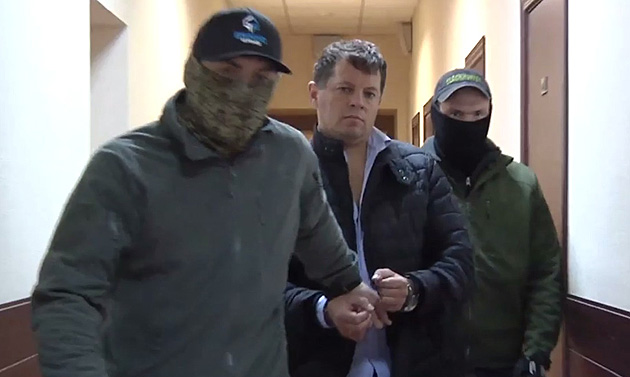
Sushchenko's whereabouts were first announced by well-known human rights activist Zoya Svetova, who "accidentally" found him in the Lefortovo pre-trial detention center on Sunday, October 2. In the early hours of October 3, Ukrinform contacted well-known Russian lawyer Mark Feygin, who undertook to defend Roman. Next day Feygin managed to visit his client for the first time, which is very important. The next stage was the insistent struggle of the Foreign Ministry for the admission of the Ukrainian consul to the journalist – Hennadiy Breskalenko managed to visit Roman only on October 10.
The reaction of the Russian media was curious. At first, Sushchenko's defamation was very dense. In the news he was described as just a "spy," they did not talk about his journalistic work at all and published fascinating reviews in the media such as "Spies of world history working under journalistic cover." Sushchenko in the company of Maugham, Green and Fleming. A glorious company - it would be funny if it were not so sad.
But very soon the strategy changed – they started to keep the case secret.
There was uneasy information background on this matter in Ukraine. By October 2016, disappointment in the recent heroine Nadia Savchenko was already very strong. At the same time, they started spreading a message in the Ukrainian mass consciousness, seemingly not without support from outside, that one should be wary of Ukrainian political prisoners detained in Russia and that the struggle for their liberation is a dubious business.
In such conditions Roman's colleagues, first of all, at Ukrinform, at the Information Policy Ministry, as well as representatives of the public and various branches of the Ukrainian authorities, began to fight for public opinion on the Sushchenko case. The Ukrainian Foreign Ministry reacted swiftly. The Verkhovna Rada of Ukraine appealed to the parliaments of the EU member states, the United States, Canada and Japan, the European Parliament, the OSCE Chairman-in-Office, German Foreign Minister Frank-Walter Steinmeier and OSCE Representative on Freedom of the Media Dunja Mijatovic with the call to consolidate efforts on observing the rights of Ukrainian journalists Roman Sushchenko and Mykola Semena, who was detained earlier. Various national and international journalistic organizations spoke out in support of Roman. OSCE Representative on Freedom of the Media Dunja Mijatovic was also engaged in his case. It is significant that the Russian authorities rejected her request to visit the Ukrainian journalist.
NOVEMBER 2016
A month after the journalist was arrested, it was finally understood that it would not be possible to get him out of prison quickly. So it means there will be a long, tense struggle.
Flash mob #FreeSushchenko, which was launched in late October, started to spread in November. In Ukraine, as well as abroad, they started to hold pickets and rallies involving the Ukrainian diaspora, local activists, and human rights defenders.
At the beginning of the month, the Consular Service Department of the Ukrainian Foreign Ministry held an interdepartmental meeting, with the participation of lawyer Feygin, to discuss the situation with the illegal detention of Sushchenko. It was very important for the subsequent coordination of actions.
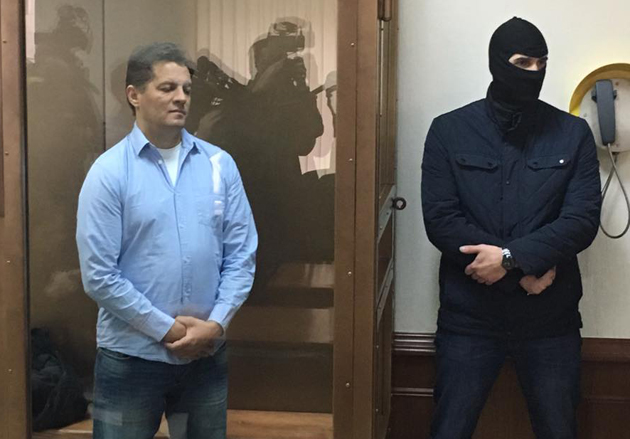
As is known, lawyer Feygin is building his defense and, as he says, "rescue of the client" on maximum publicity. However, the FSB, attaching the status of a state secret to the Sushchenko case from the very beginning, made his work extremely difficult. Since then, the lawyer is forced to balance on a fine line: he cannot tell too much, but being silent, without throwing anything into the media, is fatal.
In November, Feygin explained, transparently, without disclosing any details, but at the same time clearly enough, that the provocation against Sushchenko had been prepared long before, most likely a year before his arrest. He was betrayed by his old friend, whom he has known for about 30 years. This information was very important, as it gave a simple, understandable, "instant photo" of the case.
In the same month, the work began in the "French direction," which is natural, because Roman worked in Paris and was accredited by the French Foreign Ministry.
DECEMBER 2016
At the beginning of the month, lawyer Feygin visited the capitals of France and Belgium in connection with the Sushchenko case. In Paris, he had important meetings at the Foreign Ministry, at the Elysee Palace. In Brussels, he met with the deputies of the European Parliament who expressed their support for Sushchenko.
A press conference involving Anzhelika Sushchenko was held in the French capital. A charming wife, a strong family with two children, tough and at the same time public, transparent work of a journalist accredited in Paris - it all looks like an FSB scheme about an "intelligence officer working under the cover."
Since Sushchenko declared himself as a believing Christian, the parishioners of the Ukrainian Orthodox Church (Kyiv Patriarchate) and the defense team tried to get a pass for a priest of his confession. However, in mid-December, they received a final official ban from the FSB, violating the rights of our colleague for spiritual nourishment (nothing has changed since then). At that time, on the eve of Christmas, they forbad to hand Roman prayers with a good farewell from Patriarch Filaret.
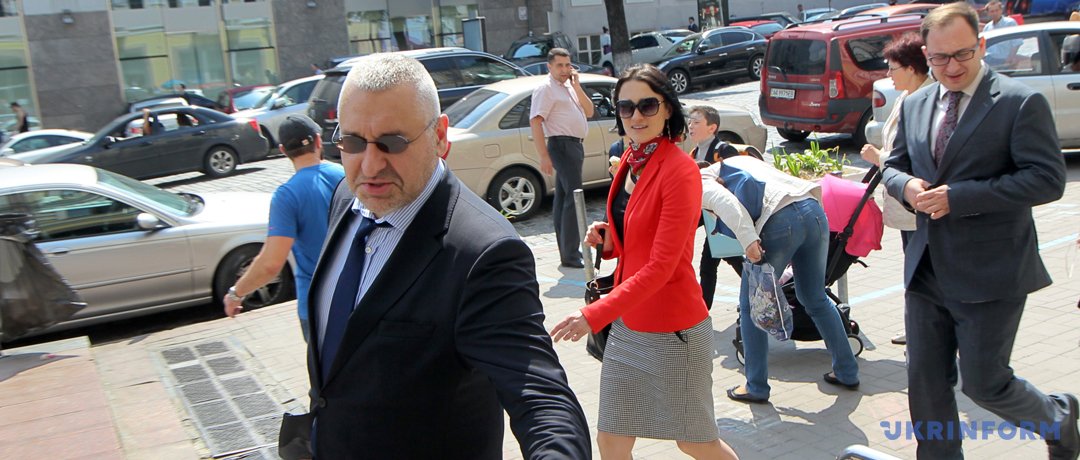
An important detail – Putin was asked at a press conference at the end of the year about the possible release of Ukrainian journalist Sushchenko. It is not difficult to guess what he answered. However, it was an important fact that a man who ran a neighboring country in a manual mode started talking about Roman and showed his awareness of the case. That was important for starting a conversation and promoting negotiations on a possible exchange.
JANUARY 2017
Even more important was the receipt by Roman Sushchenko of a letter from Ukrainian President Petro Poroshenko. This not only showed the level of support for a political prisoner, but also gave a clear signal to international organizations and representatives of the authorities of foreign countries: "Sushchenko is a Ukrainian international journalist. The Ukrainian state at the highest level confirms this status and fights for him in this capacity."
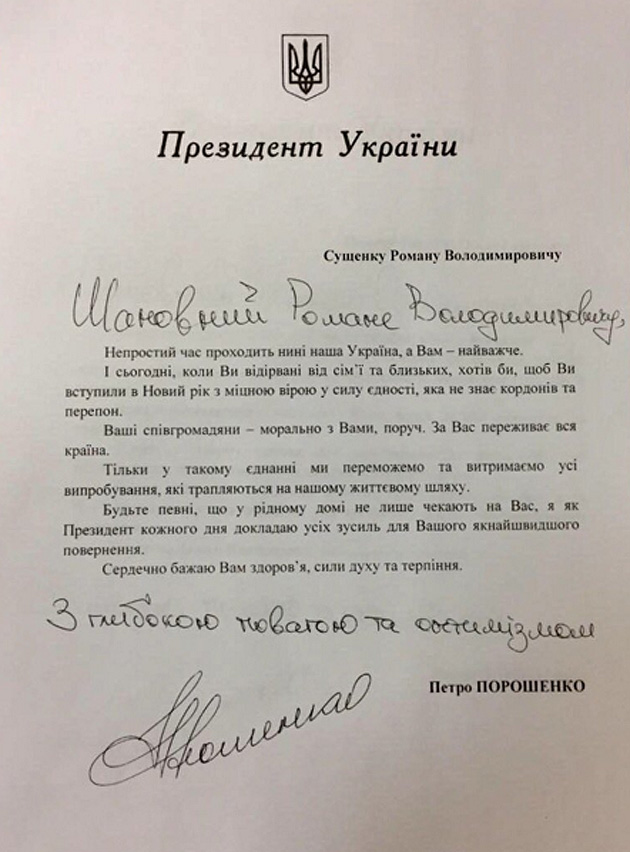
Gradually, step by step, letter by letter, appeal by appeal, the international support of Sushchenko was growing. In this regard, the demand of the Parliamentary Assembly of the Council of Europe to release the unlawfully arrested Ukrinform correspondent was very significant.
FEBRUARY 2017
On February 8, Roman Sushchenko marked his birthday in prison – for the first time. A lot of congratulations were sent to him in jail (however, because of censorship, letters arrive with a few months delay). Network flashmobs were conducted.
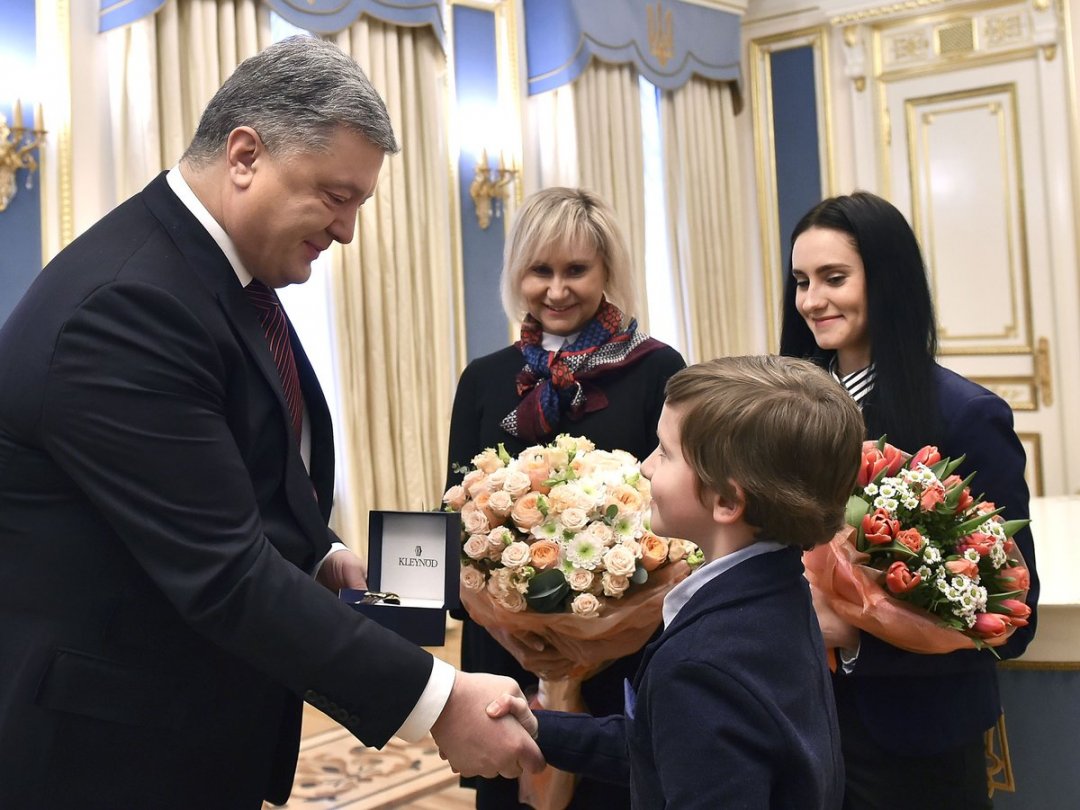
In Kyiv, on the occasion of his birthday, the Information Policy Ministry and the Ministry of Foreign Affairs, as well as Ukrinform, organized a conference on the Roman Sushchenko case for representatives of the foreign diplomatic corps and the media. The event also included a demonstration of a UATV film "Prisoners of the Kremlin" about Sushchenko and other Ukrainian political prisoners, an exhibition of photographs and paintings by Roman, and a press conference by lawyer Mark Feygin and Sushchenko's wife.
President Petro Poroshenko, in honor of the journalist's birthday, invited his wife and children.
In general, there were a lot of congratulations on this day - from Ukrainian and foreign friends, colleagues, diplomats, politicians and even sympathizers.
MARCH 2017
Meanwhile, the so-called investigation into the Sushchenko case was proceeding very slowly. There were often periods when there was not a single investigative action during the whole week. Therefore, there was an impression that the Russian leadership could not decide in which direction to move the case.
Therefore, even local, but tangible procedural victories were important. For example, the FSB Investigative Department still added to the Sushchenko case the documents requested and received by lawyer Mark Feygin from Ukrainian agencies (they confirmed Sushchenko's status as journalist and his education).
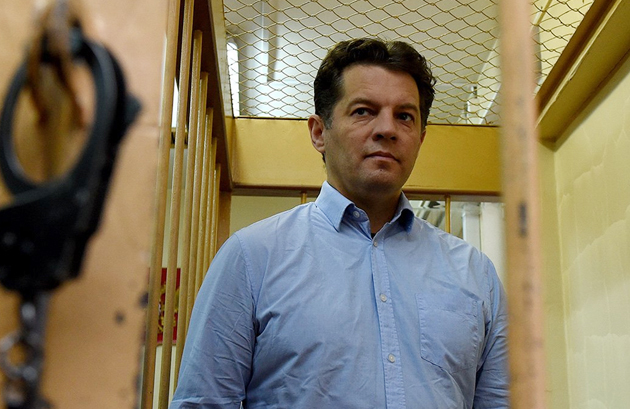
Fears also arose that the Russian media, in this case the NTV channel, was preparing a defamatory material against Sushchenko. Such a fear existed before, from the very beginning, for example, when Roman's clothes were seized after his arrest. The second time it was ahead of the New Year, when rumors about this arose. But most of all - in March, when NTV editors persistently called Feygin and asked him for comment. (Since then, the Russian propagandists have not yet released a detailed story about Sushchenko).
Well, and perhaps the main news of March. Anzhelika Sushchenko finally received the permission to visit her husband. She visited him and returned safely to Kyiv.
APRIL 2017
At the beginning of the month, Mark Feygin went to Washington, where he held many prearranged business meetings - with congressmen, employees of the State Department, the White House. After this trip, it was possible to say with confidence that the case of Sushchenko was on the agenda of American politicians.
The second extremely important news was the first round of presidential elections in France (April 23). The "change" in the French political system triggered by these elections hampered the appeal to France over the fate of the accredited international journalist.
While leading in the ratings were the politicians who spoke about their positive attitude towards Putin, the situation for Ukraine in general and for the case of Sushchenko in particular remained quite alarming. But then Emmanuel Macron, who firmly declared his principled upholding of democratic values, took off to the top.
Macron won the elections in the first round. Some 24% of the vote became a good bid for the final victory.
MAY 2017
In the second round (on May 7), Emmanuel Macron garnered a bit over 66% and became the president of France, pushing aside Putin's protege Marin Le Pen.
However, the Russian leader found an excuse to come to the newly elected president of France in a few weeks. The reception hosted by Macron was strong and tough. In particular, when asked about the situation with the detention of Sushchenko, Macron said that in this situation he would look for "a solution that would correspond to the values we are committed to." And he stressed: "I will not give up values!"
JUNE 2017
A month later, at the end of June, Ukrainian President Petro Poroshenko arrived in Paris. This meeting was held in a completely different tone. And a gift from the Ukrainian side was very symbolic - a great picture by Roman (as we managed to learn from Anzhelika, it was a gift to her, but in the current situation she was happy to send the picture to the French capital).
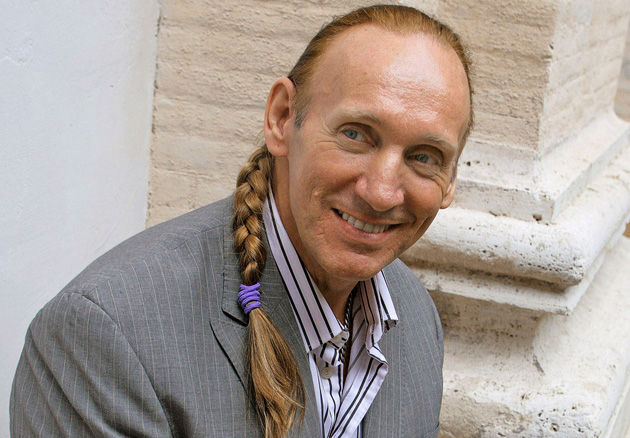
And one more international artistic news. A famous Australian writer, the author of the cult novel Shantaram, Gregory Roberts, commented on the words of Ukrinform journalist Roman Sushchenko that his book is one of the most popular in the library in the Lefortovo detention center.
JULY 2017
In the middle of summer, important news came from Washington: the Commission on Security and Cooperation in Europe (the U.S. Helsinki Commission) included Ukrainian journalist Roman Sushchenko in the list of political prisoners in Russia. And this is a very serious statement.
On July 24, Petro Poroshenko, during a conference call in the Normandy format, again urged Russia to immediately release Ukrainian hostages on Russian territory, including Roman Sushchenko and Oleg Sentsov.
AUGUST 2017
On August 18, lawyer Feygin said he had received a letter from Germany indicating that "the case of journalist Sushchenko is a matter of concern for the German leadership." And this was also very important, given that on the eve of the parliamentary elections in Germany Chancellor Merkel's CDU/CSU bloc was in the lead. And this means that there will still be support from France and Germany when discussing the issues of political prisoners in the Normandy format.
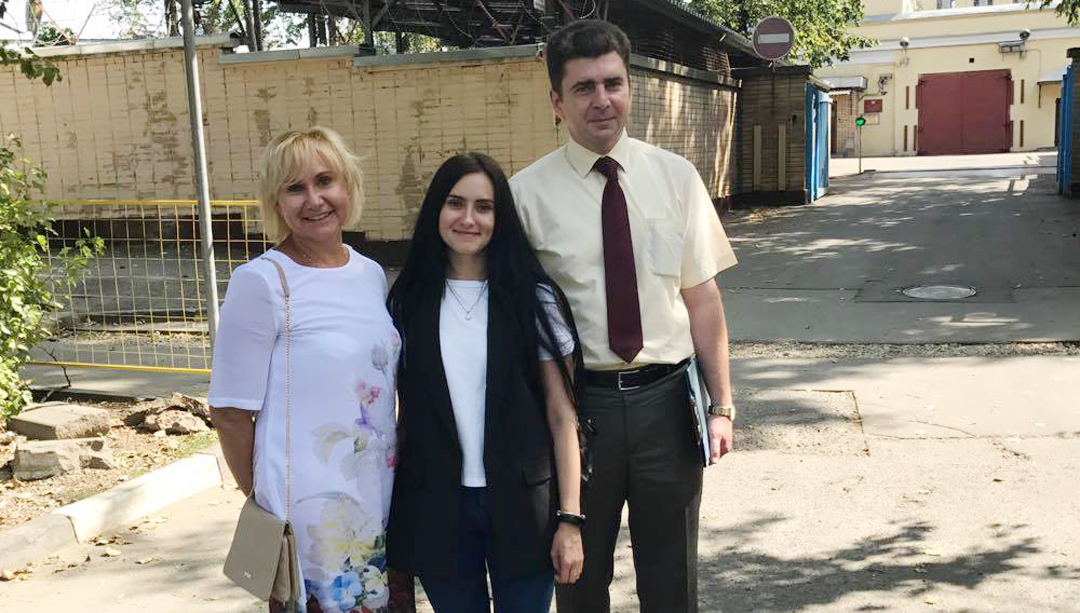
A few days later, Roman Sushchenko had a second meeting with his relatives, now not only with his wife, but also with his daughter. However, Yulia complained that "the meeting with my father was interrupted after an hour and a half, although they promised it would be three." Well, a ten-year-old son, Maksym, would get a phone call to start.
SEPTEMBER 2017
In September, it is possible to note a statement by new OSCE Representative on Freedom of the Media Harlem Desir (who succeeded Dunja Mijatovic) that his structure demands that Russia release illegally detained Ukrainian journalists Roman Sushchenko, Mykola Semena and Stanislav Aseyev.
Funny detail - while working in Paris, Roman made an interview with Harlem. And the latter, as it turned out, is well aware of the case of the Ukrainian journalist: "I am well aware of the situation with Roman Sushchenko. My office was informed about it, and we are following this very closely. This was one of the first issues I paid attention to after my appointment to the post."
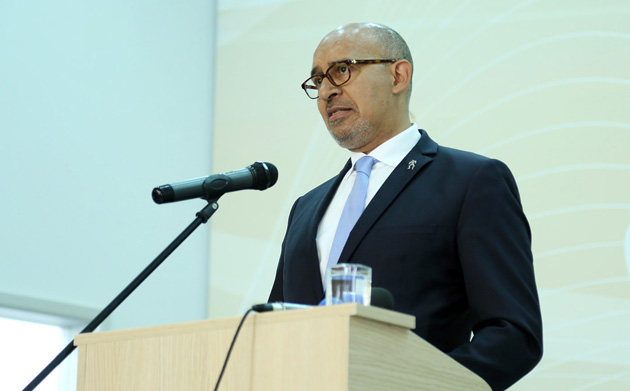
Shortly before the first anniversary of Sushchenko's unlawful arrest, Ukrinform received a letter from Tristan Bromet, the head of office of Brigitte Macron. The first lady of France conveyed sincere words of support to the wife of the Ukrainian journalist and political prisoner. The letter also said that the French authorities paid special attention to the case of Roman Sushchenko, in particular, they earlier urged Russia to explain the reasons for his detention. "We assure you that France will continue to closely monitor this issue," reads the letter.
On September 17, at the main book event of Ukraine, the Forum of Publishers in Lviv, there was a discussion titled "Victims of Moscow: Ukrainian journalists in captivity of the aggressor." The moderator of the event, Chairman of the National Union of Journalists of Ukraine, Serhiy Tomilenko, read out a greeting from Sushchenko from Lefortovo. The forum also adopted a statement calling on the country's creative intellectuals to support illegally imprisoned Ukrainian journalists, in particular, Roman Sushchenko and Mykola Semena. A few days later, a large-scale march of student solidarity with the prisoners of Moscow was held in Lviv - for the liberation of Sushchenko, Semena and other Ukrainians illegally detained and imprisoned by the Kremlin.
And, finally, the long-awaited elections in Germany. Yes, the victory of the CDU/CSU turned out to be not very significant, yes, they managed to get into parliament, taking the third place in the elections, Putin's allies - the right-conservative party "Alternative for Germany." But Merkel still remains chancellor (however, she will have to hold tough talks on the coalition in order to form a government).
* * *
The term of Sushchenko's detention ended ahead of the first anniversary of his arrest on September 30. At the beginning of the week, it was expectedly extended for two months, until November 30. The struggle for the liberation of Sushchenko continues.
What is the difference between the case of Roman and the cases of other political prisoners, particularly the case of Nadia Savchenko, which is well-known to the whole world? It's a combination of the detainee's journalist profession as a symbol of openness, transparency and state secrets, with which Russia justifies everything, including its refusal to provide evidence of guilt, even despite numerous appeals from journalistic and human rights organizations.
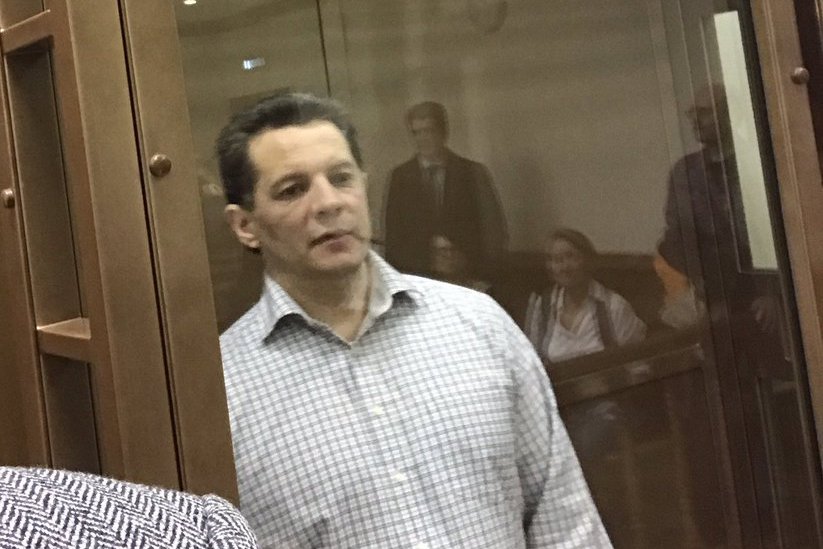
Roman's "one year behind bars" confirmed the fact that it is impossible to pull any Ukrainian political prisoner out of Russia without widespread international pressure on the Kremlin. The fact that the Sushchenko case was currently raised to the level of the Normandy format is a concrete result. But there is no doubt that there is still a lot of work ahead.
Oleh Kudrin, Riga.
